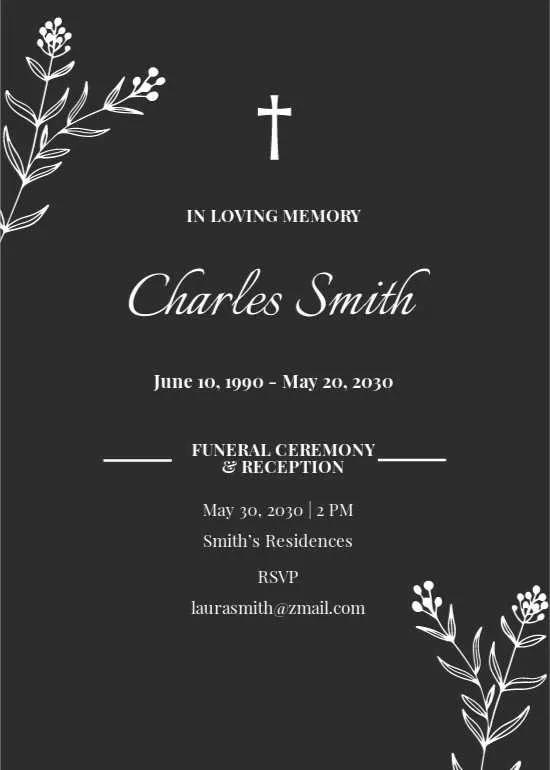How to Write a Meaningful Death Anniversary Invitation Message for Loved Ones

Invite loved ones to remember and honor the memory of someone who has passed with a heartfelt message that captures the spirit of the occasion. Crafting a message for a death anniversary should focus on connection and respect, offering a warm, reflective space for all who attend.
Start your invitation with a simple, sincere invitation to gather. Use clear, straightforward language to convey the purpose of the event. For example: “You are invited to join us in remembering [Name] on the anniversary of their passing.” This sets the tone and communicates the importance of the gathering.
Next, acknowledge the significance of the day and invite others to reflect on shared memories. You can write something like: “We gather to celebrate the life of [Name], share stories, and honor their legacy.” This invites people to not only attend but also engage emotionally, making the gathering more meaningful.
Finally, include key event details such as the time, date, and location. Keep this section clear to ensure everyone knows the logistical information without distraction. For example: “The event will take place on [Date] at [Time] at [Location].” A simple and direct statement ensures the invitation is easy to follow.
Death Anniversary Invitation Message
Write a heartfelt message that resonates with the memory of the person who has passed. Keep it simple yet sincere. Acknowledge their life and the legacy they left behind. An invitation for a death anniversary should reflect the significance of the occasion while inviting others to honor the memory together.
For example, consider this approach: “As we remember [Name] on the [number] anniversary of their passing, we invite you to join us for a quiet gathering to reflect on the moments we shared. Your presence would mean a lot as we celebrate their life and cherish their memories.” This message offers both respect and warmth, encouraging others to come together in remembrance.
If the event includes a special activity, like lighting candles or sharing stories, mention it clearly in the message: “Please bring a candle to light in their memory and share a memory if you wish.” This adds a personal touch, making the invitation more inviting.
End with a gentle reminder about the location, time, and any other details relevant to the event: “We look forward to your presence on [date] at [location], starting at [time]. Let us come together to honor the life of [Name].”
Choosing the Right Tone for a Death Anniversary Invitation Message
Keep the tone respectful and considerate. Acknowledge the grief that comes with remembering a loved one while offering comfort. Choose words that invite reflection and quiet remembrance, without being too somber or heavy. It’s essential to strike a balance between honoring the person’s memory and providing a sense of peace to the invitees.
For a more formal message, keep the language elegant yet simple, avoiding overly emotional expressions. Focus on the positive aspects of the person’s life, highlighting moments that friends and family will remember fondly. If you prefer a lighter, more personal touch, you may incorporate warm memories or stories that emphasize connection and love, offering a space for collective remembrance.
Be mindful of the cultural and religious contexts of those you are inviting. Some traditions may call for a solemn, reflective tone, while others might embrace a celebratory remembrance. Tailoring the message to align with these practices ensures that the invitation resonates appropriately with the intended audience.
Consider the relationship between the deceased and the invitees. A message to close family may include a more intimate tone, expressing deep personal feelings, while a broader circle of friends may benefit from a message that invites them to reflect collectively on the person’s legacy. Keeping the tone inclusive and thoughtful makes everyone feel welcome, regardless of how they may have known the individual.
Lastly, avoid language that could unintentionally upset or confuse. Keep the wording clear and heartfelt, without overstating emotions or making assumptions. Acknowledge the sadness, but allow room for hopeful reflection on the life lived. This approach helps create a meaningful invitation for all who wish to honor the anniversary of a loved one’s passing.
When and How to Send a Death Anniversary Invitation Message
Send the invitation for a death anniversary gathering about 1-2 weeks before the date. This allows invitees enough time to adjust their schedules and make necessary arrangements. If you’re planning a memorial event, it’s best to notify close family members and friends well in advance, especially if travel is involved.
- Timing: Aim to send the message at least a week ahead of the anniversary, but avoid sending it too far in advance–people may forget the date.
- Tone: Keep the message warm and respectful, acknowledging the significance of the day without making the tone too heavy. A simple invitation to remember and honor the departed person will resonate best.
- Details: Be clear about the time, place, and nature of the event (whether it’s a small gathering, a formal ceremony, or a private moment of reflection).
- Method: A death anniversary message can be sent via email, text, or even a handwritten note. The method depends on the relationship with the recipient and the nature of the gathering.
After sending the invitation, follow up a couple of days before the event to confirm attendance. Make sure everyone has the necessary details and feels comfortable attending. It’s thoughtful to express gratitude to those who attend or send their condolences afterward. Keep the message respectful and focused on honoring the memory of the deceased.